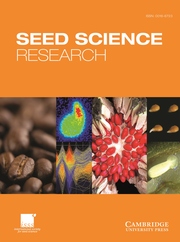Article contents
Seed science in the 21st century: rights that scientists have to deal with
Published online by Cambridge University Press: 05 January 2012
Abstract
Seed researchers, like anybody else working with materials containing genes, have to deal with a variety of rules. Their ‘freedom to operate’ does not only depend on intellectual property rights but also on various rights arising from biodiversity policies and possibly traditional knowledge. The most relevant are, however, patents on both materials and biotechnologies. It is in this field that recent developments indicate that the pendulum of ever-increasing levels of rights has started to swing back a little. This is due to recent court cases both in the USA and Europe, and emerging political debates in various countries. After describing the general policy arena involving national sovereign rights, private rights and ‘group-rights’ we focus on recent trends in the patent system. Seed scientists hardly even had to deal with such rights in the past, but in the 21st century they need to be aware of their implications.
- Type
- Review Article
- Information
- Seed Science Research , Volume 22 , Supplement S1: Seed Science in the 21st Century , February 2012 , pp. S9 - S14
- Copyright
- Copyright © Cambridge University Press 2012
References
- 2
- Cited by


